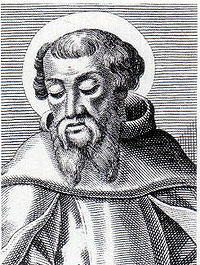WCG: Irenaeus on the Trinity

An engraving allegedly of Irenaeus, in Gaul (now Lyons, France)
The Tkach Worldwide Church of God which now calls itself GCI, sponsors a website that yesterday posted the following:
The Surprising God Blog
A forum for discussing Christ-centered, trinitarian theology
6.09.2009
Irenaeus on the Trinity
In about A.D. 180, Irenaeus … wrote the following important statement concerning the triune God (quoted from “The Christian Theology Reader” by Alister McGrath, p. 93).
We find here the basic elements of the doctrine of the trinity…
GCI then quotes some passages from A. McGrath’s book. GCI apparently concluded that Irenaeus supported the trinity.
But perhaps it should have included comments from other scholars on the same passages.
For example, commenting on the above passages from Irenaeus, scholar F. R. Montgomery Hitchcock, M.A. D.D. (Formerly University Student, Fellowship Prizeman and Donnellan Lecturer of Trinity College, Dublin) wrote:
We now come to a rather complicated problem, in which it is difficult to mark the exact positions of Irenaeus the relation of the Divine Persons of the Godhead to one another. In some passages the Persons are coordinated ; while in others there seems to be a subordination in the relations of the Son to the Father. and of the Spirit to the Son.
Thus, I am not the only scholar who realize that the passages in question do not clearly support the trinity.
Furthermore, GCI and others seem to overlooked the following writing from Irenaeus:
…there is none other called God by the Scriptures except the Father of all, and the Son, and those who possess the adoption (Irenaeus. Adversus haereses, Book IV, Preface, Verse 4. Excerpted from Ante-Nicene Fathers, Volume 1. Edited by Alexander Roberts & James Donaldson. American Edition, 1885. Online Edition Copyright © 2004 by K. Knight).
Notice that Irenaeus states that only the Father, the Son, and those who possess the adoption (Christians) are God. This is a binitarian, not a trinitarian view.
While we in the Living Church of God do believe in the Father, the Son, and the Holy Spirit, that does not mean that we believe in the Greco-Roman trinity that was adopted at the Council of Constantinople in 381 A.D.
Even though he was a heretic, nor did Irenaeus espouse what became adopted as the Greco-Roman trinity.
Some articles of possibly related interest may include:
Binitarian View: One God, Two Beings Before the Beginning Is binitarianism the correct position? What about unitarianism or trinitarianism?
Is The Father God? What is the view of the Bible? What was the view of the early church?
Jesus is God, But Was Made Man Was Jesus fully human and fully God or what?
Virgin Birth: Does the Bible Teach It? What does the Bible teach? What is claimed in The Da Vinci Code?
Did Early Christians Think the Holy Spirit Was A Separate Person in a Trinity? Or did they have a different view?
Did the True Church Ever Teach a Trinity? Most act like this is so, but is it?
Was Unitarianism the Teaching of the Bible or Early Church? Many, including Jehovah’s Witnesses, claim it was, but was it?
Binitarianism: One God, Two Beings Before the Beginning This is a shorter article than the Binitarian View article, but has a little more information on binitarianism.
Irenaeus: The Most Dangerous Heretic? Was Irenaeus a faithful peacemaker or was he possibly the most dangerous of the early heretics?
The History of Early Christianity Are you aware that what most people believe is not what truly happened to the true Christian church? Do you know where the early church was based? Do you know what were the doctrines of the early church? Is your faith really based upon the truth or compromise?
 |
Tweet |
|